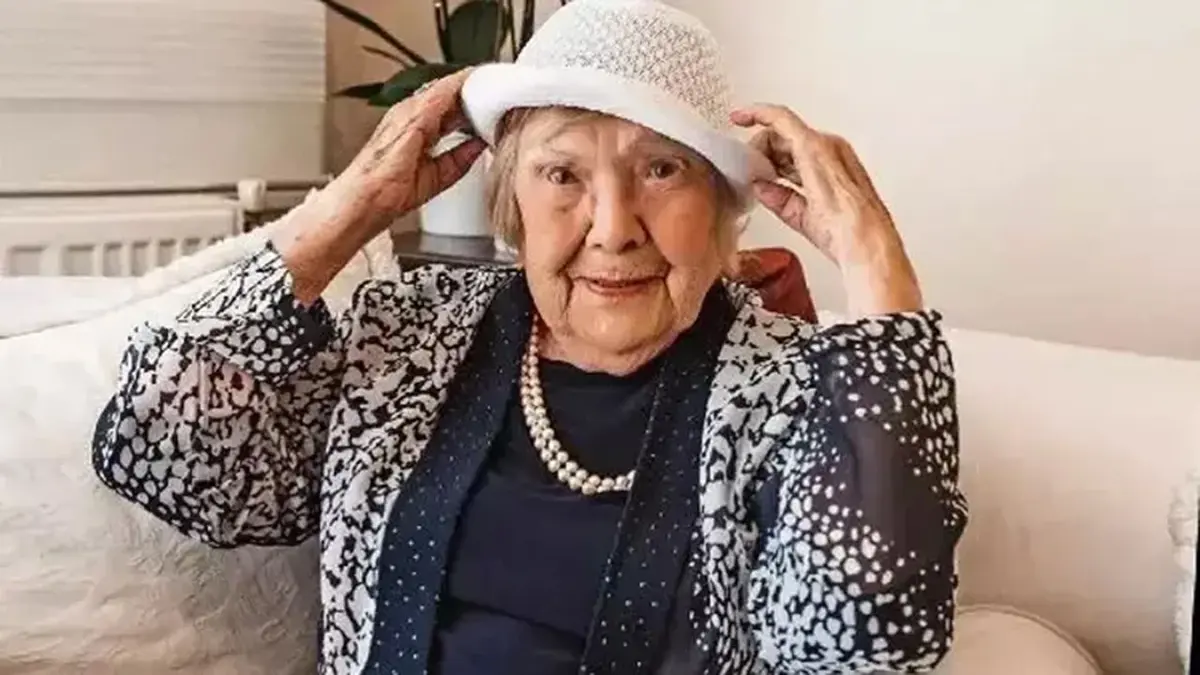Researcher and writer Muazzez İlmiye Çığ, known for her work on the Sumerians, passed away yesterday (Nov 17) at a private hospital in Mezitli, Mersin.
Born in Bursa in 1914, Çığ’s death was announced by Kaynak Publishing: "We mourn the loss of Muazzez İlmiye Çığ, a tireless and ageless figure of Turkey's enlightenment struggle, our esteemed scientist, the last ‘Sumerian Queen,’ and beloved author. Our condolences to her family, readers, and the nation."
Çığ graduated from İstanbul University’s Faculty of Letters, where she studied Hittitology, Sumerology, and Archaeology. Following her graduation, she worked at the Museum of Ancient Oriental Works in Ankara, focusing on the classification, translation, and interpretation of cuneiform tablets.
HZİ Neuropsychiatry Foundation
Çığ was a notable figure during the 1980 coup era, serving as the chair of the board for the HZİ Neuropsychiatry Foundation. The foundation became controversial due to allegations of conducting drug experiments on political prisoners. She also held the position of chief advisor to the chair of the Vatan (Homeland) Party.
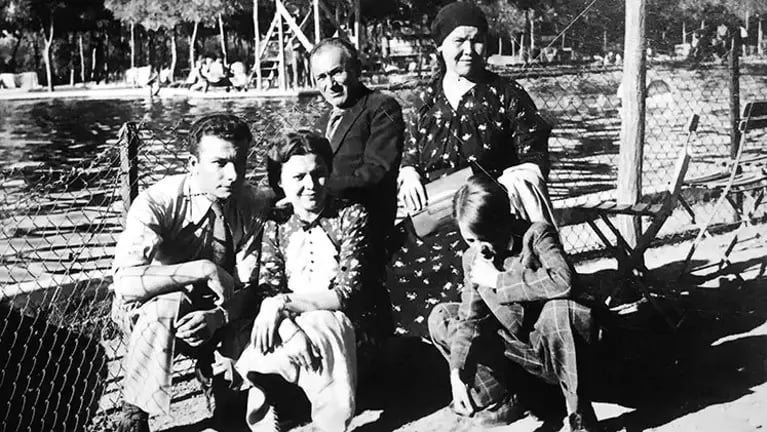
The HZİ name is derived from the initials of Hamide Zekeriya İtil, the parents of Prof. Dr. Turan İtil and Muazzez İlmiye Çığ.
In the 1980s, the foundation faced allegations that drugs banned in the US were tested on patients and prisoners in Turkey. It was claimed that revolutionary prisoners were taken to the foundation’s Gayrettepe center in İstanbul against their will and used as test subjects for medications intended for the US market. These accusations came to light after a female academic leaked information to the press.
Çığ defended the research, claiming it adhered to ethical standards and that participants had given their consent. However, Prof. Dr. Nusret Fişek, then president of the Turkish Medical Association (TTB), stated, "Such experiments are against medical ethics," and criticized the government for failing to establish a committee to oversee such research.
The claims gained significant traction in publications like Cumhuriyet and Nokta in 1985, sparking criticism from scientists. The experiments were compared to unethical medical trials conducted in Nazi Germany. The foundation did not directly deny the allegations. Prof. Dr. Nevzat Tarhan, a member of the research team, refuted accusations of his direct involvement in the drug trials.
In June 1990, four members of the Devrimci-Sol (Revolutionary Left) militant group evacuated staff from the Gayrettepe HZİ Foundation building and planted a homemade bomb. Following the attack, the group issued a statement claiming responsibility, declaring, "The HZİ Foundation, serving American pharmaceutical monopolies and financed by the CIA, has been attacked and destroyed by our organization." After the incident, Prof. Dr. Turan İtil left Turkey.
According to a report by Sadık Güleç for Gazete Duvar, the only legal case related to the alleged torture and experimentation involved a nationalist detained during the 1980 coup period. Recep Küçükizsiz, who claimed to have been tortured by a doctor known as "Mengele" at Mamak Prison, filed a complaint after recognizing the individual on a television program. Küçükizsiz identified Turan İtil as part of the torture team, but the investigation yielded no results.
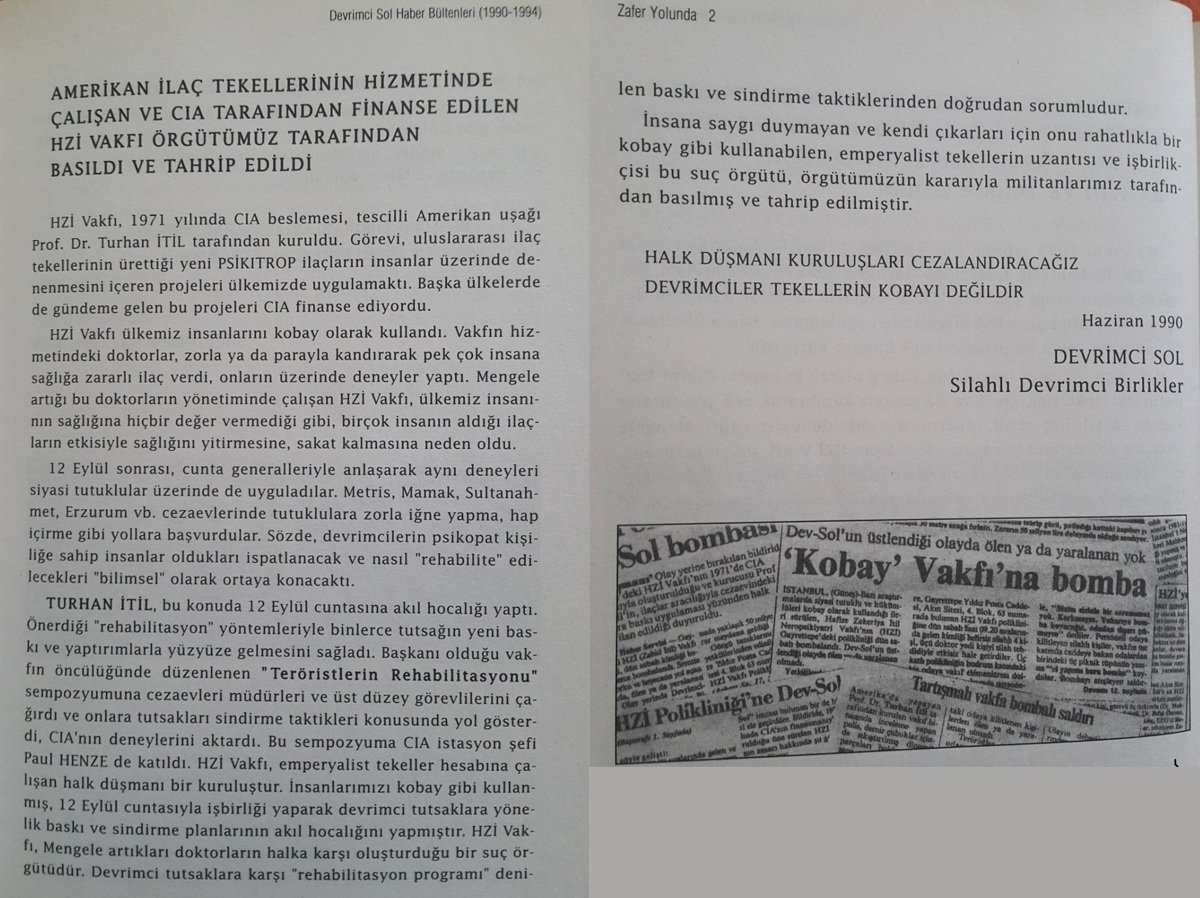
'Dr. Mengele practices’
In a 2009 column, Evrensel columnist Ertuğrul Ünlütürk commented on Muazzez İlmiye Çığ and the allegations surrounding the HZİ Foundation:
“We don’t live in the past, but we never forget it. We must remember, recognize, and expose what those parading as secular and modern today have done in the past.
“In 1984, as prisons across the country were filled to capacity with revolutionary inmates, we began receiving reports from inside. Some revolutionaries in Metris Prison were being taken for involuntary medical ‘examinations.’ They were brought to the Gayrettepe headquarters of the HZİ Neuropsychiatry Foundation. There, these revolutionaries were used as guinea pigs for testing drugs intended for the US market. It was a practice eerily reminiscent of what Dr. Mengele did to prisoners in Nazi Germany.
“This foundation, which was supposed to be under the oversight of the Directorate General of Foundations like all others in the country, used revolutionaries from state prisons for the purposes of pharmaceutical monopolies. The chair of this foundation’s board was Sumerologist Muazzez İlmiye Çığ, and her brother, Dr. Turan İtil, served as both an administrator and experiment conductor. It is also well-known that the prominent doctor Ayhan Songar participated in these experiments.
‘The crimes endure’
“The foundation's name, HZİ, was formed from the initials of Muazzez İlmiye Çığ and Turan İtil’s mother, Hafize Zekeriya İtil. Dr. Turan İtil admitted in a medical bulletin published in the US that detainees were used as guinea pigs. He now lives in the US, working as a faculty member at New York University, continuing to wear his academic robes. Ayhan Songar, who disclosed the results of these experiments in casual conversations, passed away a few years ago. After revolutionaries rendered the Gayrettepe headquarters inoperable in 1990, the HZİ Foundation shut down, but its crimes remain.
“I don’t know if Muazzez İlmiye Çığ, as the chair of the foundation’s board, was aware of what was happening, but she surely learned of it later. This matter was widely discussed in public but was never denied. It’s also true that the issue was swept under the rug.
"If we are not afraid of confronting our past and are committed to facing it, we must recognize and remember the faces beneath the robes. In this period, where wheat and chaff are mixed, and modernity is claimed under robes, we have a lot of work to do if we are to find meaning in every robe."
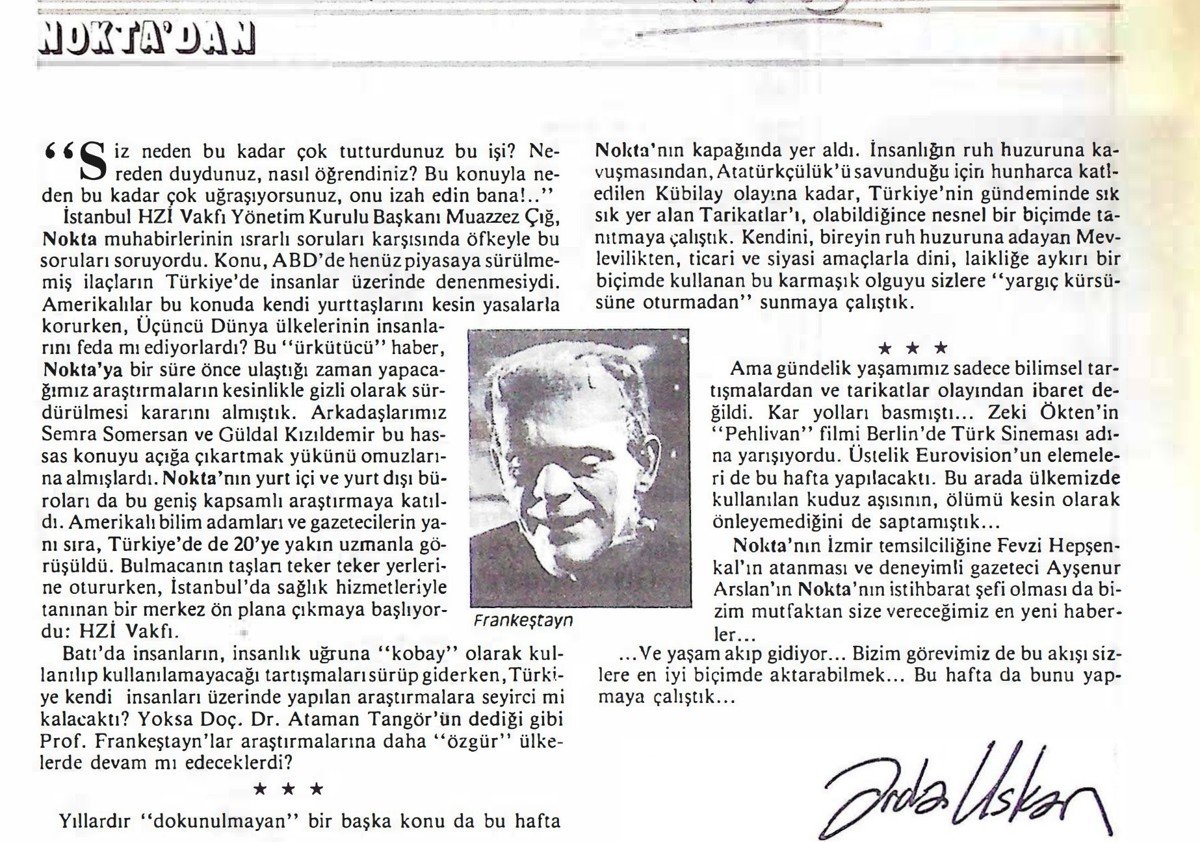
Çığ's reaction to journalists
When questioned by reporters from Nokta magazine about these allegations on March 3, 1985, Çığ replied, “Why are you so insistent about this issue? Where did you hear this, how did you find out? Explain to me why you are so preoccupied with this matter…”
Nokta magazine, in its coverage of the story, explained its reasons for pursuing the allegations:
"Muazzez İlmiye Çığ, Chairperson of the İstanbul HZİ Foundation Board, angrily questioned our reporters’ persistence: ‘Why are you so adamant about this matter? Where did you hear about it? Why are you so preoccupied with this?’ The issue at hand was the testing of drugs on humans in Turkey that had not yet been released in the US. While Americans were protected by strict laws regarding such practices, were people in Third World countries being sacrificed for these experiments?
"When this ‘alarming’ tip reached Nokta, we decided to proceed with our investigation under strict secrecy. Our colleagues Semra Somersan and Güldal Kızıldemir took on the burden of exposing this sensitive matter. Both domestic and international Nokta offices participated in this extensive investigation. Interviews were conducted with American scientists, journalists, and nearly 20 experts in Turkey.
"As pieces of the puzzle slowly fell into place, one health institution in İstanbul began to emerge prominently: the HZİ Foundation.
"While debates continued in the West about whether people could ethically be used as 'guinea pigs' in the name of science, was Turkey turning a blind eye to research being conducted on its own citizens? Or, as Associate Professor Ataman Tangör suggested, were the likes of ‘Professor Frankensteins’ simply carrying out their experiments more freely in countries like Turkey?"
‘Terrorists are outright stupid’
Professor Dr. Turan İtil, who was both Muazzez İlmiye Çığ’s brother and associated with the controversial experiments, spoke to Nokta in his capacity as a "terrorism researcher."
“I used to think terrorists were all paranoid schizophrenics,” he stated. “Now, like other terrorism experts, I see a communist behind every terrorist. The terrorists in prisons are outright stupid…”
Claiming that “terrorism” had hereditary roots, İtil argued that blood relations were unusually common among terrorists: “This isn’t a coincidence. They are specifically chosen. It’s terrifying… It feels like science fiction.”
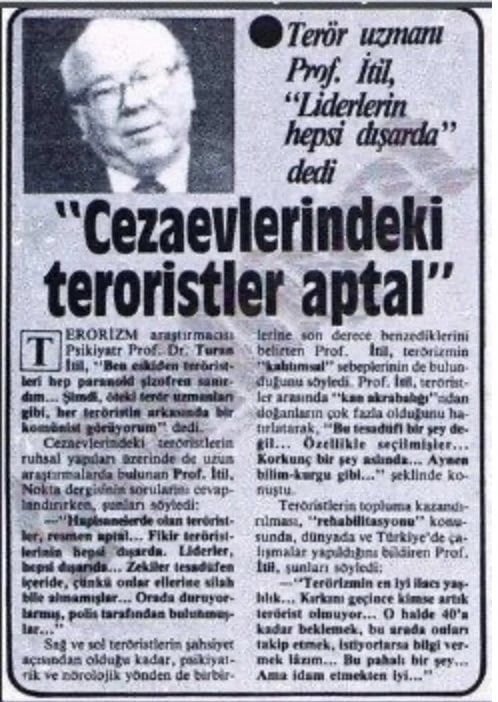
Allegations raised in parliament
The allegations of experiments conducted on revolutionary prisoners by the foundation led by Çığ were brought to the Turkish Grand National Assembly (TBMM).
On May 15, 1985, Ali İhsan Elgin, a Member of Parliament representing İçel (Mersin) from the People’s Party and the Social Democratic Populist Party (SHP), submitted a parliamentary inquiry addressed to the Minister of Health and Social Welfare, Mehmet Aydın. The inquiry posed the following questions:
- Can drugs or chemical substances that have not been tested on humans in the US or Europe, and therefore have not been released to the market, be brought into Turkey without obtaining a license from the Ministry of Health and Social Welfare?
- Even if licensed, can such drugs or substances be tested on humans in Turkey?
- Did the HZİ Foundation receive permission from the Ministry of Health and Social Welfare for the drug trials it conducted or is conducting? If so, where are the permission documents?
- What are the names and chemical compositions of the drugs or substances tested on humans at HZİ?
In response, the minister denied the allegations, claiming that the prisoners had voluntarily participated in the experiments. (TY/VK)





